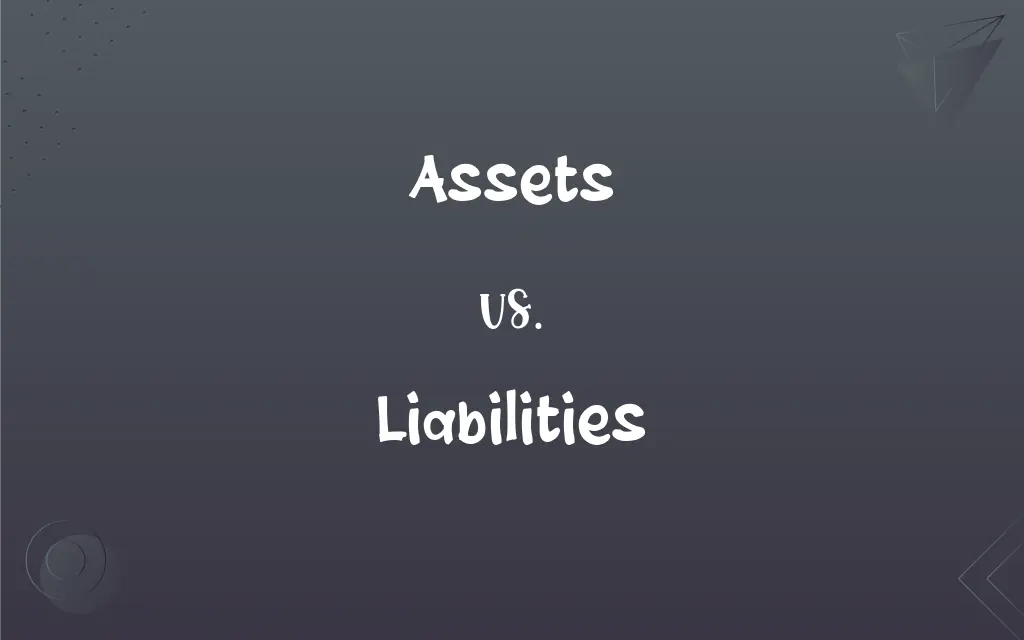Assets vs. Liabilities: What's the Difference?
Edited by Aimie Carlson || By Janet White || Published on January 5, 2024
Assets are resources with economic value owned by an individual or company. Liabilities are financial obligations or debts owed by an individual or company.

Key Differences
Assets are economic resources that hold value and can provide future benefits, such as cash, property, or equipment. Liabilities, in contrast, are financial obligations or debts that a company or individual owes, which must be settled over time.
Assets are often used to generate revenue and increase a company's or individual's wealth. They include tangible items like real estate and equipment, and intangible items like patents and trademarks. Liabilities, however, represent claims against a company’s assets and can include loans, mortgages, and other financial obligations.
The balance between assets and liabilities is crucial for financial health. Assets can increase in value and contribute to net worth, while liabilities, requiring regular repayments, can decrease net worth if not managed properly.
Assets are typically listed on the left side of a balance sheet, indicating their positive contribution to a company’s value. Liabilities are listed on the right side, reflecting their nature as debts that need to be paid off.
The management of assets and liabilities is key to financial stability and growth. Effective asset management can lead to profitability and business expansion, while effective liability management involves controlling and reducing debts.
ADVERTISEMENT
Comparison Chart
Definition
Economic resources that hold value
Financial obligations or debts
Impact on Net Worth
Increase net worth
Decrease net worth
Examples
Cash, real estate, stocks
Loans, mortgages, credit card debts
Balance Sheet Position
Left side
Right side
Purpose
Generate revenue, increase wealth
Reflect debts that need repayment
ADVERTISEMENT
Assets and Liabilities Definitions
Assets
Resources owned by a person or business that have value.
The company's assets include its buildings and machinery.
Liabilities
Obligations that decrease a company's net worth.
Unpaid taxes are recorded as liabilities on the balance sheet.
Assets
Anything valuable that an individual or company controls.
The brand's reputation is among its most valuable assets.
Liabilities
Responsibilities to pay money to others.
Credit card balances are considered personal liabilities.
Assets
Economic resources expected to provide future benefits.
The new software developed by the company is an intangible asset.
Liabilities
Legal debts owed to another person or institution.
The mortgage on the office building is the company's largest liability.
Assets
Items of ownership convertible into cash.
Stocks and bonds are considered liquid assets.
Liabilities
Financial debts or obligations that arise during business operations.
The company's liabilities include a bank loan and accounts payable.
Assets
Holdings that can be used to produce income.
Rental properties are income-generating assets.
Liabilities
Claims against a company's assets by creditors.
Outstanding invoices from suppliers are current liabilities.
Liabilities
The state of being liable.
Liabilities
Something for which one is liable; an obligation, responsibility, or debt.
Liabilities
Liabilities The financial obligations entered in the balance sheet of a business enterprise.
Liabilities
Something that holds one back; a handicap.
Liabilities
Likelihood.
Liabilities
Plural of liability
Liabilities
(finance) An amount of money in a company that is owed to someone and has to be paid in the future, such as tax, debt, interest, and mortgage payments.
Liabilities
(accounting) The right side of a balance sheet.
Liabilities
Anything that is owed to someone else
FAQs
What are liabilities?
Liabilities are debts or financial obligations a person or company owes.
What are assets in simple terms?
Assets are valuable items or resources owned by a person or company.
What are long-term liabilities?
Long-term liabilities are debts or obligations due beyond one year.
Are investments considered assets?
Yes, investments like stocks and bonds are assets.
Are salaries and wages liabilities?
Yes, they are liabilities as they are financial obligations a company owes to its employees.
Why are liabilities important in accounting?
Liabilities are crucial for understanding a company’s financial obligations and overall financial health.
Can an asset become a liability?
Yes, if an asset no longer provides value or generates costs, it can become a liability.
What is the most common form of assets?
Cash is the most common and liquid form of an asset.
Are loans considered liabilities?
Yes, loans are liabilities as they represent money that must be repaid.
How do assets impact a company’s financial health?
Assets can enhance a company’s financial strength by providing value and potential income.
How are liabilities managed in a business?
Liabilities are managed through strategic financial planning and ensuring timely repayments.
Can a company operate without liabilities?
While possible, most companies have some form of liabilities as part of their financial structure.
Do assets always appreciate in value?
Not always; some assets can depreciate or lose value over time.
Are employee benefits considered liabilities?
Yes, future employee benefits can be recorded as liabilities.
How do assets and liabilities relate to net worth?
Net worth is calculated as assets minus liabilities.
Is rent a liability for a business?
Yes, rent is a liability as it's a regular financial obligation.
Are assets always physical items?
No, assets can also be intangible, like goodwill or intellectual property.
Can intangible items be assets?
Yes, intangibles like patents or trademarks are considered assets.
What are current liabilities?
Current liabilities are debts or obligations due within one year.
Do liabilities always involve money?
Primarily, yes, as they represent financial obligations.
About Author
Written by
Janet WhiteJanet White has been an esteemed writer and blogger for Difference Wiki. Holding a Master's degree in Science and Medical Journalism from the prestigious Boston University, she has consistently demonstrated her expertise and passion for her field. When she's not immersed in her work, Janet relishes her time exercising, delving into a good book, and cherishing moments with friends and family.
Edited by
Aimie CarlsonAimie Carlson, holding a master's degree in English literature, is a fervent English language enthusiast. She lends her writing talents to Difference Wiki, a prominent website that specializes in comparisons, offering readers insightful analyses that both captivate and inform.





































































